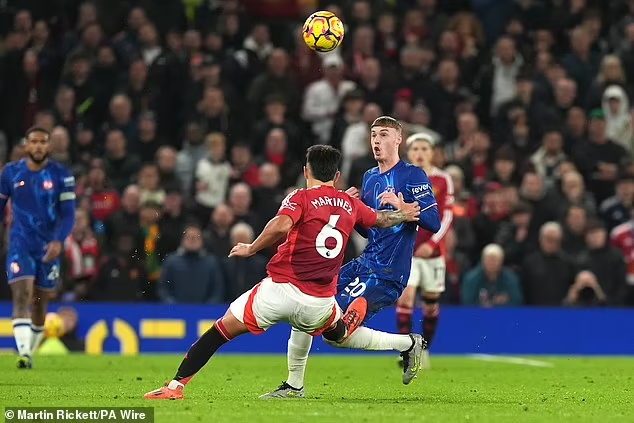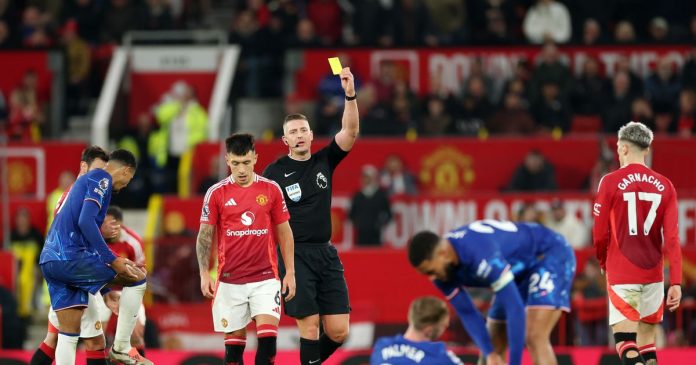In a closely contested 1-1 draw between Manchester United and Chelsea, Lisandro Martinez found himself at the center of a heated debate over a controversial decision. The Argentine defender, known for his aggressive style, clashed with Chelsea’s Cole Palmer in an incident that many believed warranted a red card. However, the referee opted for a yellow card instead, a decision that was upheld by VAR, leaving fans and pundits divided.
The Incident: Lisandro Martinez vs. Cole Palmer
As Manchester United and Chelsea were locked in a tense 1-1 draw at Old Trafford, the final minutes saw an intense moment that had fans on the edge of their seats. Chelsea’s Cole Palmer, known for his technical skill and clever movement, flicked the ball over Martinez’s head in an attempt to evade the Argentine defender. In response, Martinez, attempting to intercept the ball, stretched out his leg but missed, instead scraping his studs across Palmer’s knee.

This high-contact challenge raised immediate concerns about player safety. Referee Robert Jones initially played an advantage but soon halted the play and issued a yellow card to Martinez. The decision surprised many who expected a harsher punishment, particularly given the visible impact of the studs-up challenge on Palmer.
Why Wasn’t Martinez Shown a Red Card?
Despite the outcry from fans, the final decision was upheld by VAR official Michael Salisbury at Stockley Park. According to the Premier League’s official Match Centre, the challenge was deemed a “reckless challenge” rather than “serious foul play,” which carries a red-card sanction. This distinction hinges on specific definitions within the FA Handbook’s Law 12, which addresses fouls and misconduct.
Understanding Law 12: The Difference Between Reckless and Serious Foul Play
The FA Handbook categorizes fouls into varying levels of severity:
- Reckless Challenge: Defined as a challenge where a player shows disregard for the consequences on an opponent, warranting a yellow card.
- Serious Foul Play: Defined as a challenge that endangers the safety of an opponent or involves excessive force or brutality, typically resulting in a red card.
In Martinez’s case, the referee and VAR judged his challenge to fall under the “reckless” category rather than “serious foul play.” Although the challenge was certainly forceful, the officials decided it did not pose a significant enough risk to Palmer’s safety to justify a red card. This decision was ultimately subjective, hinging on the officials’ interpretation of the challenge.
Could the Decision Have Gone the Other Way?
The inherently subjective nature of these definitions means that decisions can vary depending on the officials’ perspective. Had referee Robert Jones initially issued a red card, it is unlikely that VAR would have overturned it, as VAR typically avoids interference unless there is a “clear and obvious error.”
This ambiguity in interpreting the laws leaves room for differing opinions, especially in high-stakes matches where the consequences of these decisions can heavily impact the game’s outcome.
Reactions to the Decision: Pundits and Fans Weigh In
The challenge ignited mixed reactions from both pundits and fans. Many viewers felt Martinez was fortunate to escape a red card, while others agreed with the officials’ ruling of a yellow card. Let’s explore some of the notable responses:
Pundits’ Opinions
Former Manchester United midfielder and Sky Sports pundit Roy Keane weighed in on the incident, acknowledging the challenge’s severity but ultimately describing Martinez as a “lucky boy.” Keane stated that if a red card had been issued, “there could be no complaints,” underlining the contentious nature of the decision. His comment reflects the understanding that the decision could have reasonably gone either way given the force and intent behind Martinez’s lunge.
Social Media Reactions
Fans on social media reacted passionately to the incident, sparking debates that highlighted the division in opinion on the matter. Some argued that a red card was justified due to the potential harm posed by the challenge, while others believed that Martinez’s intent was not malicious and that the yellow card sufficed.
– Not a red card for Martínez, well done by VAR. pic.twitter.com/bZ8JYxYLIn
— (@TheEuropeanLad) November 3, 2024
This divide in opinions underscores the subjective nature of officiating decisions, particularly when it comes to interpreting “serious foul play” versus “reckless” actions.
Impact of the Decision on Manchester United and Chelsea’s Season
With Manchester United looking to improve their position in the Premier League, Martinez’s presence on the pitch is critical to their defensive stability. A red card could have left United a man down, increasing Chelsea’s chances of securing a win. Furthermore, a potential suspension could have affected upcoming fixtures, putting added pressure on United’s already strained defense.
For Chelsea, the decision added to a growing sense of frustration, as they were unable to capitalize on a key moment late in the game. The club’s supporters have expressed concerns about officiating consistency, especially in high-profile matches that carry significant implications for league standings.
Refereeing in High-Stakes Matches: Calls for Consistency
This incident has reignited discussions about officiating standards and consistency in the Premier League. Many fans and analysts argue that there needs to be greater uniformity in how “reckless” versus “serious” challenges are assessed. High-stakes matches with close scores often hinge on such decisions, influencing results and, ultimately, league standings.
The incident with Martinez has emphasized the need for officials to communicate their decisions clearly, as transparency can help fans better understand why certain rulings are made. The Premier League’s recent move to offer post-game explanations on social media is a step in this direction, but there are still calls for further clarification on ambiguous terms like “reckless” and “serious.”
RELATED ARTICLES:
- 1-1 at Old Trafford: manchester United and Chelsea Ends All Square Amid Tension and Tempers
- ‘I Just Want to Stay and Help Out’: Ruud van Nistelrooy Urges Ruben Amorim to Keep Him at Man Utd


